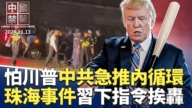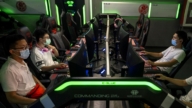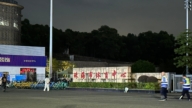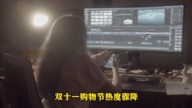【新唐人2013年07月08日訊】最近在中國的金融領域,一些智庫和商業銀行應中共國務院之邀,已經提交了十多個改革方案,而各種討論和研討會也在密集召開。有大陸媒體傳出,為了研究方案,中共一名副總理,甚至在早晨5點召集大家開會。專家指出,當局相繼出爐的擴大民間資本進入金融業,以及推進利率市場化改革等,都說明中國的金融危機已經到了火燒眉毛的程度。那麼,中共領導人的這種努力能解決問題嗎﹖中國金融危機的癥結在哪裏呢﹖我們來看看專家的分析。
中共日前發佈的一份公告顯示,中共將推進利率市場化改革,同時中共國務院辦公廳發佈了《關於金融支持經濟結構調整和轉型升級的指導意見》,明確提出「擴大民間資本進入金融業」。
美國南卡羅萊納大學艾肯商學院教授謝田:「實際上是錢荒之際,中共措手不及,不得不向民間求助的辦法。但是從中共的本質上我們可以認定,它不會真正的讓民間資本進入銀行,起到控股的作用,最多讓民間資本參股, 只是在利用老百姓的錢,但不會給老百姓權利。」
謝田說,也不能排除中共利益集團,利用民間資本進入銀行業的機會,把從國有銀行貪污的錢,以民間資本出現,這樣,就再一次方便了他們把國有財產轉變成私有財產。
謝田指出,中共恐懼一旦失去對中國經濟的控制,就會失去了對中國的控制,因而不會徹底的市場化。謝田說,前一陣,中國出現「錢荒」時,中共新政又急忙拿出5個億出來救市,就是很好的佐證。
北京大學經濟學教授夏業良:「中國金融系統是有很脆弱的一些特徵,出現這樣的錢荒,就說明它的市場化的程度是很低的,因為在一個市場開放的體系中,它的流動性是很重要的,假如說流動性出現很大的問題,就說明這個金融系統存在著系統性的問題。」
謝田還表示,中國現在面臨的經濟困境,正是因為中共當年搞所謂經濟自由化時,沒有引進資本主義自由經濟中的「公平競爭」、「法治」,以及「媒體監督」等機製造成的。
謝田:「我們現在看到的中國發生的危機,經濟危機,包括金融危機,實際上就是中共的獨裁和市場化發生矛盾的時刻,現在推行利率的市場化,不改變政治體制和整個社會體制,可以肯定是走不遠的。」
最近媒體出現了一個新名字「李克強經濟學」。有人詮釋李克強經濟學政策的框架,關鍵點是「無刺激」、「去槓桿」和「結構改革」,也就是說,讓中國經濟重回市場的軌道。
謝田:「我們要問的一點是,他是為甚麼在做?如果是為救黨的話,注定他是走不下去的,因為如果有共產黨利益在其中這樣一個前提,他不會真正為中國人民著想,也不會真正解決中國現在的問題。救中國祇有打破共產黨的一黨獨裁和專政的體制才能實現,這樣,中國的金融才能有新的希望。」
中共國務院宣佈允許私人資本進入銀行業的同時,還公開表明,民營銀行將自擔風險,並且將由銀監會、中國人民銀行、工商總局和法制辦等組成工作機構,負責具體事宜。
謝田指出,這種做法與中共對國有銀行有了危機時總是慷慨解囊,形成鮮明對比,也說明﹕中共不是真正歡迎民營金融機構。謝田表示,也正因為中共對國有銀行的過分寵愛,才造成國有銀行敢於亂來。
謝田還指出,在美國等民主國家,所有銀行都是私人銀行,因為有銀行儲蓄保險公司和政府擔保與監管,老百姓的存款就不會出現問題。
採訪編輯/劉惠 後製/蕭宇
China’s Financial Crisis – A Desperate Situation
Over a dozen financial reform plans have reportedly
been brainstormed for China’s State Council.
Many discussions and seminars have also been
held over the past days.
Media have reported that a deputy premier even
held a meeting at 5:00 am to find a solution.
The Chinese Communist Party (CCP) authorities
have recently given private capital access to the financial sector.
Also, it has boosted a reform of market-oriented
interest rates.
Expert say that all these signify that China’s
financial crisis has been desperate.
Will these approaches help the CCP to
settle problems?
Where is the crux of China’s financial crisis?
Let’s see what experts are saying about the issue.
The CCP authorities have declared they will push
forward interest rate liberalization reform.
The State Council has released guidance
on financial support for economic restructuring and transformation.
It specifically mentions to “expand private capital
into the financial sector.”
(Prof. Univ. of South Carolina –Aiken) Xie Tian:
“The CCP was caught unprepared by the banks’ shortage of money.
So this is a way for it to use private capital.
But we’re sure that the CCP’s nature decides that
it won’t really allow private capital to develop a predominant sharehold in the banks.
Private capital may hold partial ownership at most.
be blunt, this helps the CCP to use private money,
but it won’t give the populace real rights.”
CCP interest groups may also exploit the opportunity,
says Xie Tian.
That is, they inject the embezzled money from state
owned banks, but under the name of private capital.
A good way for them to transform state assets
into their own private property.
Xie Tian notes that the CCP fears losing control of
the economy, as it is the core of its control over China.
So, the regime won’t implement a full market operation.
The new CCP administration’s hasty pump of
500 million yuan,
which was intended to ease the recent
money shortage, has proved this, he says.
(Prof. of Economics, Peking University)Xia Yeliang:
“China’s financial system is fragile.
The money shortage shows a low level of marketization.
For a liberal system, liquidity is very important.
An occurrence of liquidity problems signals
systemic problems in financial sector.”
According to Xie Tian, China’s current economic
plight is due to a lack of “fair competition”,
“rule of law” and “watchdog journalism”.
These mechanisms weren’t introduced when the CCP
implemented the so-called economic liberalization.
Xie Tian: “Now China’s crises have occurred
in economy and in finance.
In fact, this is the moment when the dictatorship
clashes with the market forces.
Its interest rate liberalization reform definitely won’t
succeed, if the political system remains unchanged.”
China’s media has recently coined a new term,
“Li Keqiang Economics”.
It is interpreted with features of “no-stimulus”,
“deleveraging” and “structural reforms”.
That is, letting China’s economy get back
on the track of marketization.
Xie Tian: “The question is why he is doing so?
If he wants to use this measure to save the CCP,
it’s doomed to failure.
This is because it premises the existence of
CCP interest groups.
That makes him unable to truly think about
the interests of the Chinese people,
and neither can it really solve current problems in China.
The only solution to save China is to
get rid of the CCP’s dictatorial regime.
That’s the only way to bring new hope
for China’s financial system.”
The regime has also stated that private banks
shall be responsible for taking their own risks.
The formation of private financial institutions
will be under the leadership of a joint state agency.
Xie Tian indicates that the approach has formed
a sharp contrast to previous official cash injections in solving the state-owned banks’ crises.
This is also a reminder that that the CCP has
never truly welcomed private financial institutions.
Xie Tian points out that the CCP’s long-term pampering
has encouraged the state-owned banks reckless behavior.
Xie Tian mentions that in the US and in other
democratic countries, all banks are private.
Federal Deposit Insurance companies protect
local citizens against losses in case of bank failure.




























